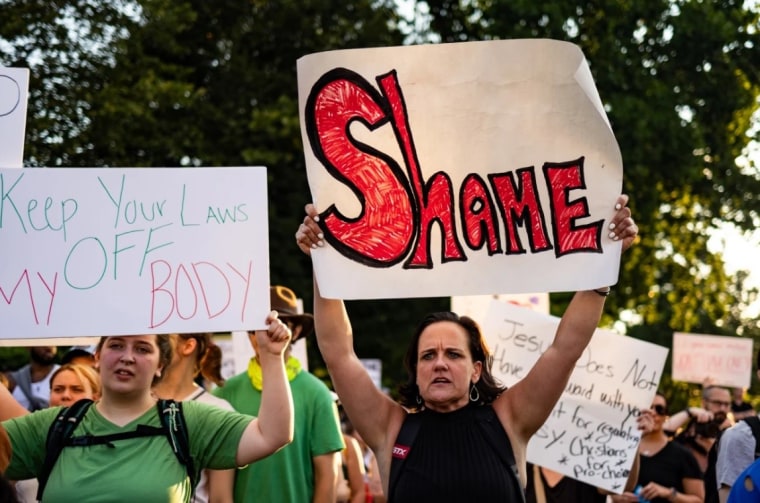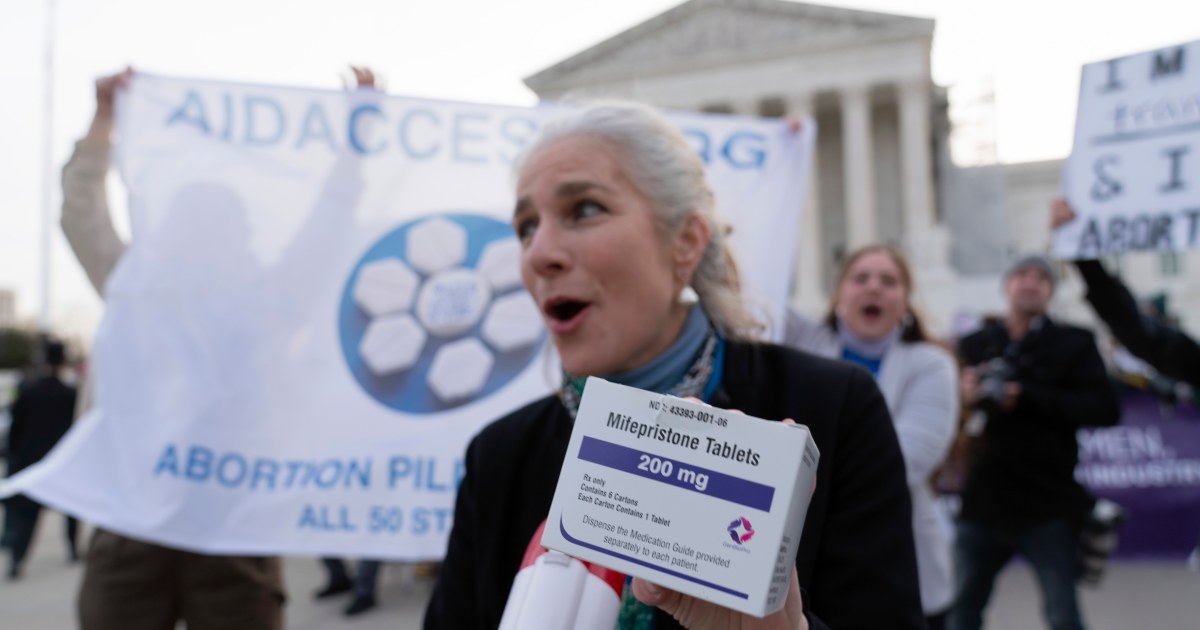By Elizabeth Chuck
Maternal mortality rates in the United States are sure to rise as more states restrict abortion after the fall of Roe v.
Wade, according to experts.
A sobering prediction, as new statistics show the already disproportionate effect of the COVID-19 pandemic on motherhood.
With a rate higher than any other developed country, maternal mortality in the United States is staggeringly high, especially for people of color.
[More than a dozen states ban or limit abortion following Supreme Court ruling. This is the access map]
Pre-pandemic statistics showed that about 700 people died each year from pregnancy-related complications, and that black and American Indian/Alaska Native women were three times more likely to die from a pregnancy-related cause than white women. white women, according to the Centers for Disease Control and Prevention (CDC).
An analysis published Tuesday in JAMA Network Open revealed that maternal female deaths increased in 2020 by as much as 41% following the declaration of the pandemic.
The increases were most marked for Hispanic and black women.
Pharmacies in the United States begin to ration birth control pills
June 28, 202200:36
As states across the country restrict access to abortion, women's health advocates and researchers predict that women's maternal mortality rate and its racial disparities will only worsen, especially as states who are banning abortion are often those who already have high rates of maternal mortality.
"I have no doubt that we should expect the already abysmal and disproportionate maternal mortality and morbidity rates to increase," said Andrea Miller, president of the National Institute of Reproductive Health, referring to maternal deaths and related conditions. with pregnancy that adversely affect women's health.
[Abortion clinics close immediately after the end of Roe v. Wade and patients miss scheduled appointments]
In part, he said, it's a numbers game.
With more limits on access to abortion, there will be more pregnancies and more chance of complications.
"Some of those pregnancies will be healthy, some will have complications," Miller predicted.
"And even those with healthy pregnancies will add to the strain that already exists on our health care system," she added.
The CDC defines deaths of pregnant women as death during pregnancy or within one year of delivery from any cause related to or aggravated by the pregnancy or its management.
Tuesday's analysis from JAMA Network Open compared maternal mortality data from 2018 to March 2020 with data from April to December 2020.
[A magistrate asks to “reconsider” protections for contraceptives and same-sex weddings]
Maternal deaths - those that occur during pregnancy or within 42 days of giving birth - increased by 33.3% after March 2020 compared to before the pandemic, while late maternal deaths - those that occurred produced more than 42 days but less than a year after calving - increased by 41%.
Abortion rights protesters protest outside the Supreme Court on Saturday.Hannah Beier/NBC News
The Guttmacher Institute, a research organization that supports reproductive rights, anticipates that 26 states are certain or likely to ban abortion now that there are no federal protections, including 13 that had trigger laws with abortion bans that were designed to go into effect. force once Roe v.
Wade was overruled.
[“I was raped and had an abortion”: this Latina claims that a right is “robbed” from women]
Among them is Mississippi, the state at the center of the decision that overturned the landmark ruling, which according to a 2019 report has a maternal mortality rate nearly double the national average.
The state offers few health and social networks for mothers.
Earlier this year, Republican leaders in the Mississippi House of Representatives killed a bill that would have extended Medicaid coverage for one year for mothers after giving birth, instead of two months.
Mississippi's racial disparities are especially shocking: It's nearly 118 times more dangerous for black women to give birth there than to have an abortion, according to Michele Bratcher Goodwin, author of
Policing the Womb: Invisible Women and the Criminalization of Motherhood
, which cites state health data. .
Abortion Advocates Press Government to Protect Access to Reproductive Health
June 27, 202201:53
In Louisiana, where Republican Sen. Bill Cassidy recently sparked a firestorm over his comments downplaying the racial disparity in maternal mortality, black mothers are four times more likely to die than white ones.
The state's maternity care “deserts” have been correlated with particularly poor pregnancy outcomes.
[Judge Temporarily Blocks Texas Law Banning Abortion Entirely]
The reasons for the racial disparities in those states and across the country are multifactorial, according to Rachel Hardeman, a Blue Cross professor of health and racial equity at the University of Minnesota School of Public Health.
Among them are structural racism and a lack of investment in the communities in which Black, Latino and Indigenous people live, work and play;
the possible lack of access to reproductive health services, from prenatal care to abortion services;
and “weathering,” the notion that daily exposure to racism impairs health and advances aging at a biological level.
The annulment of Roe v.
Wade has implications for much more than women's health care.
“It is important to think about both the Supreme Court decision and its direct impact on access to reproductive health and abortion services, but it is also important to think about it as part of a larger part of the health policies that are perpetuating racism and white supremacy,” Hardeman recalled.
[The long journey of a right: How did this controversial moment about abortion come about?]
The sentence drop will cause racial disparities in maternal mortality to exacerbate "that gap," he said.
How to avoid a rise in maternal deaths
As abortion bans take effect, so-called sanctuary states are absorbing more patients.
The Atlanta Feminist Women's Health Center has received calls from hundreds of people from neighboring states seeking dates since Roe's overturn, according to Executive Director Kwajelyn Jackson.
Traveling to such places can be costly for many people, both financially and otherwise.
And with Georgia awaiting a court ruling on a strict abortion ban, the health center's ability to perform abortions could soon be severely restricted.
[One defends abortion, another condemns it: Latina women weigh in on the repeal of Roe v. wade]
Jackson said successful grassroots organizations should lead discussions across the country on how to prevent maternal deaths.
"What I want to see is more of the knowledge and experience of Black people who have done this work in their communities," he said, citing the example of the Black Mamas Matter Alliance, a nonprofit organization that promotes Black maternal health rights.
He also urged more investment in local and personalized knowledge.
Those who oppose abortion believe that "it is wonderful news" what the Supreme Court decided
June 24, 202202:14
"The interventions we need in Alaska are not going to look like the ones we need in Mississippi," he said.
Hardeman said an "all hands on deck" approach will be needed to prevent maternal deaths, especially among people of color.
The next election cycle will be key to that, he said, and so doing everything you can to avoid voter suppression will be too.
[California will decide in November whether to include the right to abortion in the state constitution]
Miller said advocacy work should focus on expanding affordable health care for contraception, pregnancy-related care and abortions, including eliminating co-pays for abortions.
He said he hoped more people would take up this cause as something they care about, given the effect it will have on their lives, albeit indirectly.
"Everyone in the world is going to be affected by the added pressure on our healthcare system, by the added pressure on our economy, and by the added pressure on communities and community supports," Miller said.
“It's not just a domino effect.
It's like a tsunami effect,” she added.


/cloudfront-eu-central-1.images.arcpublishing.com/prisa/3F3EHAP7NYDCD7NIOIZLOQJFPI.jpg)












